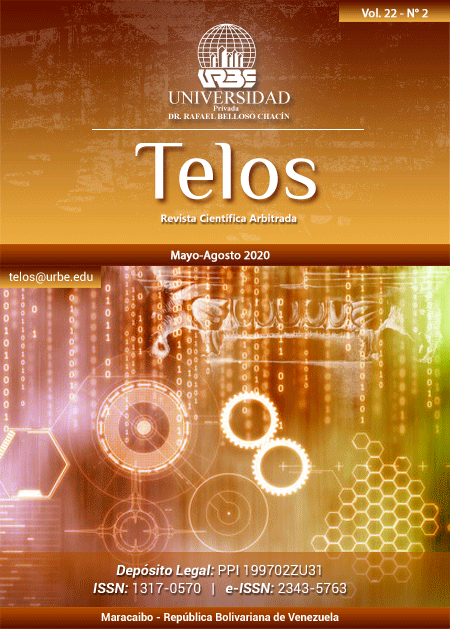Argumentation as troubleshooting in the neocorporativistic speech of venezuelan policies (1989-1994). Critical analysis.
DOI:
https://doi.org/10.36390/telos222.14Abstract
The discourse of Development Plans in Venezuela (1989-1994) is critically analyzed in order to unveil the argumentative strategies that ideologically justify the policies formulated by the International Monetary Fund (IMF) in the context of applying the neocorporativist model of the new economy neoliberal The theoretical framework basically contemplates the authors: Maniglio (2017), White (1999), Habermas (1999), Beaugrande and Dressler (1997), Martín y Whittaker (1998), Charaudeau (1992) y Pottier (1992). The methodology used combines the design of argumentative structures and critical discourse analysis with the “round trip” abductive process between theory and practice (Wodak, 2003: 109). The results are: construction of argumentative relationships and identification of resources and strategies used as legitimation / delegitimization operations. It concludes: 1) the evaluative resources, assessments and axiological modalities used in practical, normative and ethical judgments are fundamentally the basis of the argumentative strategies that justify the link between problems and solutions, and in this sense, these strategies persuade about “being "And the duty" of policies. 2) the arguments presented are increasingly prescriptive and with high coercive discursive levels, both explicit and implicit.
Downloads
References
Adam, Jean y Lorda, Clara (1999). Lingüística de los textos narrativos. Ariel. España.
Aguilar, Luis (2006). Gobernanza y gestión pública. Fondo de cultura económica. México.
Beaugrande, Robert y Dressler, Wolfgang. (1997). Introducción a la lingüística del texto. Ariel. España.
Calsamiglia Helena y Tusón, Amparo (1999). Las cosas del decir. Ariel. España.
Charaudeau, Patrick (1992).Grammaire du sens et de l’expression. Hachette. Francia.
Charaudeau, Patrick (2003). El Discurso de la información. Gedisa. España.
Consejo Coordinador del Plan (CORDIPLAN) (1989). VIII Plan nacional de desarrollo económico y social. Venezuela.
Consejo Nacional de Investigaciones Científicas y Tecnológicas (CONICIT) (1990. III Plan Nacional de Ciencia y Tecnología. Venezuela.
Escandell, María (1993). Introducción a la pragmática. Anthropos. España.
Franco, Antonio (2007). Gramática comunicativa. Colección textos universitarios. Vicerrectorado Académico de Universidad del Zulia. Venezuela.
Gutiérrez, Salvador. (2002). De pragmática y semántica. Arco/libros. S.L. España.
Habermas, Jürgen (1999). Teoría de la acción comunicativa. Tomo I y II. Taurus. España.
Labarriere, Jean Louis y Lazzeri, Christian; Marramao, Giacomo y otros (2000). Teoría política y comunicación. Gedisa. España.
Maniglio, Francesco (2017). El discurso tecnopolítico de la gobernanza europea: un análisis crítico del discurso (ACD) de las políticas post-Lisboa. Revista Araucaria. Volumen 19, Nº 37. España. (Pp. 327-351).
Martín, Luisa y Whittaker, Rachel (1998): poder decir o el poder de los discursos. Ediciones de la Universidad autónoma de Madrid. España.
Martínez, Rubí y Soto, Ernesto (2012). El consenso de Washington: la instauración de las políticas neoliberales en América Latina, Revista Política y cultura. Volumen 37, N° 37. México. (Pp. 35-64).
Montolío, Estrella (2001). Conectores de la lengua escrita. Ariel. España.
Pineda, Alicia (2017).Comunicar la tecnociencia: una propuesta desde el análisis de sus prácticas discursivas. Editorial académica española .España.
Pottier, Bernard (1992). Teoría y Análisis en lingüística. Gredos. España.
Serrano, Estela y Villalobos José (2006). La argumentación discursiva escrita. Publicaciones del Vicerrectorado académico de la Universidad de los Andes. Venezuela.
Van Dijk, Teum (2003). Ideología y Discurso. Ariel. España.
White, Peter. (1999) The Appraisal website:the language of actitude and interpersonal positioning. Extraído de http://www.grammatics.com/appraisal/SpanishTranslation-ppraisalOutline.doc consulta: 03/06/2013.
Wodak, Ruth y Meyer, Michel, (compiladoras). (2003). Métodos de análisis crítico del discurso. Gedisa. España.




